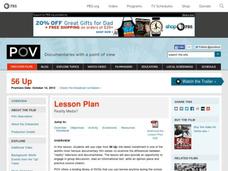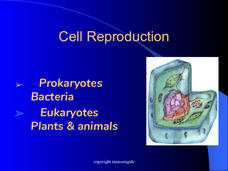Sharp School
Horror Fiction Multimedia Project
"There comes an end to all things" and ending a study of horror fiction with a multimedia project is "like starting a stone. . . away the stone goes, starting others. . ." In this case, groups start with a question generated by Dr....
The New York Times
Crossing the Line Online: Sexual Harassment and Violence in the Age of Social Media - NYTimes.com
Sexual harassment and sexual violence are by no means new issues. What has changed is the role of social media in these issues. This powerful and troubling lesson uses a specific rape case to launch research into a discussion of the...
Clark County School District
Hollywood's Take on the Cuban Missile Crisis: Thirteen Days
Watching the film Thirteen Days is an engaging way of acquainting learners with the Cuban missile crisis, and this learning exercise is the perfect accompaniment for viewership! It includes 15 questions for your young historians to...
Curated OER
Reality Media?
Yeah, but is it real? Clips from the famous documentary film series 56 UP launches an examination of the differences between reality television and documentaries. After considering the characteristics of each format, class members...
The New York Times
Stress Less: Understanding How Your Mind and Body Respond to Anxiety
What could be more relevant to teens and preteens than experiencing stress? Use an article from the New York Times website to practice valuable Common Core skills for informational text reading, and also get a discussion going in your...
Curated OER
Seeing the Image in Imagery: A Lesson Plan Using Film
In our increasingly visual society, it is often difficult for some readers to create a mental picture of a picture created only with words. An image-rich text like F. Scott Fitzgerald's The Great Gatsby can therefore, present a real...
Carolina K-12
NATO: After the Cold War
Why was the North Atlantic Treaty Organization (NATO) formed, and what is its mission? Learners discuss NATO's participation in various events throughout the Cold War and work in groups to analyze whether those responses were appropriate.
Biology Junction
Photosynthesis
Why do leaves change color in autumn? A presentation and worksheet walk through many details of photosynthesis. They explain where photosynthesis occurs, why plants are green, the changing colors in autumn, energy usage, and CAM plants.
Biology Junction
Cell Reproduction
Cycles exist throughout nature, and the cell cycle compares to a life cycle of any other living being. A worksheet and presentation discuss the concepts of cell reproduction through the cell cycle. They cover each phase individually and...
Biology Junction
Hemophilia: Genetics of the F8C Gene
Queen Victoria, of England, carried the hemophilia gene, and her children passed it on to the ruling families of Russia, Spain, and Germany. Scholars learn how hemophilia passes from generation to generation—usually undetected in women....
Biology Junction
Bioenergetics
Bioenergetics strives to describe how living things gain and transform energy for biological purposes. First, pupils learn about the types of energy before exploring the importance of energy in biological processes. Next, they discover...
Biology Junction
Mutations
Are you a mutant? Learn about multiple types of mutations with a presentation to discover the answer. Both genes and chromosomes mutate at various points in their life cycles. Slides describe each type and the resulting impact on...
Biology Junction
Mendelian Genetics
Over the course of seven years, Gregor Mendel grew more than 28,000 pea plants. The large amount of data he collected led him to postulate the rules of genetics as we understand them today. Scholars learn about Mendel, genetics, and...
K20 LEARN
This Is How the World Ends: Coronal Mass Ejections/Space Storms
Is this the end of the world as we know it? Pupils prepare for a coronal mass ejection during a lesson from the K20 Center. The activity combines video and Internet research in a collaborative assignment that focuses on public safety...
Common Sense Media
My Online Code
Approach ethical online behavior with a series of activities geared toward teaching pupils about digital citizenship. After a brief discussion about ethics, small groups inspect a fictional social networking profile with ethics in mind....
American Institute of Physics
Historical Detective: Edward Alexander Bouchet and the Washington-Du Bois Debate over African-American Education
Young scientists meet Edward Alexander Bouchet who, in 1876, was the first African American to receive a PhD in Physics. This two-part lesson first looks at the debate between Booker T. Washington and W.E.B. Du Bois about the type of...
American Institute of Physics
African Americans in Astronomy and Astrophysics
A two-part lesson focuses on the contributions to the fields of astronomy and astrophysics of two African Americans: Benjamin Banneker and Dr. George Carruthers. In part one, scholars learn about Benjamin Banneker by examining his...
Flipped Math
More Probability
Multiply the amount of probability using addition. Pupils use probabilities to make predictions in problems. They find shortcuts to find probabilities instead of listing the entire sample space. The learners then use the multiplication...
Flipped Math
Secants and Tangents
Put the vertex in, put the vertex out. Pupils explore theorems about the relationships of lengths of segments and angles of line segments that intersect inside or outside the circle. Learners use the theorems to solve problems involving...
Flipped Math
Intercepted Arcs
Intercept the class's learning on circles. Pupils learn the relationship between intercepted arcs and inscribed angles. The scholars use that information to find the relationship of angles in an inscribed quadrilateral and an angle...
Flipped Math
Chords and Arcs
Congruence breeds congruence. Pupils learn three more circle theorems dealing with congruent chords and arcs. Learners use the theorems to find the measures of chords and arcs in circles by applying previously learned concepts in the...
Flipped Math
Tangents to Circles
Touch a circle once. Individuals watch a video and learn two theorems related to tangents and circles. The pupils then apply the theorems to find missing angle measures and lengths in figures. At the end, they practice their skills on...
Flipped Math
Unit 9 Review: Area of Polygons
It's time to show what you know! Individuals first review finding the area of polygons using the formulas from parallelograms to regular polygons. They then brush up on finding the area and circumference of circles, as well as reviewing...
Flipped Math
Sectors and Segments
It's a piece of pizza! Pupils learn about a sector of a circle as a slice of the circle and determine how to find its area. Scholars continue to find out how to calculate the segment of a circle based on the sector's area. At the end,...

























